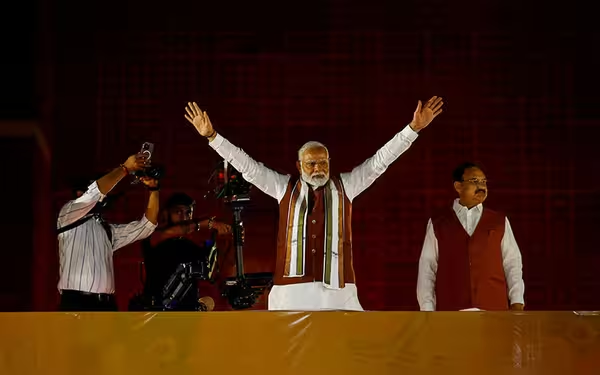Friday, December 27, 2024 11:55 AM
BJP's Anti-Muslim Campaign Fuels Victory in Maharashtra
- BJP's anti-Muslim campaign raises communal harmony concerns.
- Maharashtra victory contrasts with Jharkhand's rejection of divisive politics.
- Voter awareness of communal implications is growing.
 Image Credits: dawn.com
Image Credits: dawn.comBJP's anti-Muslim campaign secures victory in Maharashtra, raising concerns about communal harmony and voter awareness in India.
The recent elections in Maharashtra have brought to light the intense political climate in India, particularly regarding the tactics employed by the Bharatiya Janata Party (BJP). The BJP, along with its right-wing allies, has been accused of running a highly charged anti-Muslim campaign, which has raised concerns about communal harmony in the region. Prime Minister Narendra Modi's repeated assertion, “Ek hain to safe hain,” translates to “If they are united, they are safe,” has been interpreted as a rallying cry aimed at consolidating Hindu votes by instilling fear about the Muslim community.
This campaign strategy has not only sparked debates among political analysts but has also led to significant electoral outcomes. In Maharashtra, the BJP managed to secure a sweeping victory, showcasing its ability to mobilize support through divisive rhetoric. However, the situation in Jharkhand tells a different story. Here, the predominantly tribal voters rejected the BJP's communal narrative, demonstrating that not all regions are swayed by such tactics. This defeat highlights a growing resistance among voters who are increasingly aware of the implications of communal politics.
The contrasting results in these two states raise important questions about the future of political campaigning in India. While the BJP may have succeeded in Maharashtra, the backlash in Jharkhand serves as a reminder that voters are not a monolith and can respond differently to communal appeals. It suggests that there is a segment of the population that values unity and inclusivity over divisive politics.
As the political landscape continues to evolve, it is crucial for citizens to remain vigilant and informed. The implications of communal campaigns extend beyond mere electoral outcomes; they can affect social cohesion and the fabric of society. Voters must critically assess the messages being presented to them and consider the long-term effects of their choices. In a diverse nation like India, fostering understanding and cooperation among different communities is essential for a harmonious future.













